FILE - In this Wednesday, Sept. 3, 2014 file photo, Iraqi security forces and Shiite militiamen fire at Islamic State group positions during an operation outside Amirli, some 105 miles (170 kilometers) north of Baghdad, Iraq. When the Islamic State group staged a lightening advance across much of northern Iraq last year, it expanded its rule to about a third of the country, drawing in different groups with different motivations for taking up arms. In many cases, former rivals are now finding themselves in an uneasy alliance as they seek to combat the Sunni extremist group. Here are the groups involved in the anti-Islamic State war in Iraq and what they each hope to accomplish. (AP Photo, File)
The Associated Press
KIRKUK, Iraq (AP) - Shiite Arab militias have flooded into northern Iraq's Kirkuk region to help Kurdish forces battle the Islamic State group, but their uneasy alliance threatens to reignite a much older conflict over the oil-rich area pitting the largely autonomous Kurds against the Arab-led government in Baghdad.
All across Iraq, the rapid advance by the Islamic State extremists over the past year has drawn longtime rivals into reluctant alliances. The shared struggle could with time help Iraqis forge a long-elusive sense of national unity. But it also risks papering over disputes that could burst into the open if the threat subsides.
Here are some of the strange bedfellows in Iraq's fight against the Islamic State group.
___
KURDS AND SHIITES:
Shiite Arab militias officially known as the Popular Mobilization Forces have teamed up with the Kurdish peshmerga in a number of battles, breaking the siege of the northern Shiite-majority town of Amirli in August and more recently, driving IS militants from a string of towns in Diyala province, northeast of Baghdad.
But Kirkuk is different. Kurdish forces claimed control of the city just days after the Islamic State group swept across northern Iraq last June, and their longstanding goal of incorporating it and surrounding areas into their semiautonomous region seemed within reach. But the city's Arabs and Turkmen, as well as Baghdad, have long opposed such a scenario.
For now, the Shiite fighters are making common cause with the Kurds against the Islamic State group, a mortal enemy of both. But if the Iranian-backed militias gain a foothold in the region, they could one day help Baghdad wrench it back.
Kurdish regional President Massoud Barzani alluded to such fears earlier this week, saying only peshmerga troops can operate in the city of Kirkuk. The next day Hadi al-Amiri, a top Shiite militia commander, told a Kurdish TV channel his forces "are able to go wherever if needed."
___
THE U.S. AND IRAN
As the United States has assembled a coalition to aid Iraqi forces with airstrikes, Baghdad's influential neighbor Iran has organized and backed the Shiite militias on the ground. Both sides are also believed to be aiding Kurdish forces. Iraq has welcomed aid from both, but risks being drawn into a region-wide proxy war pitting Iran against the U.S. and its Gulf allies.
While Washington and Tehran both view the Islamic State as a regional menace, they are sharply divided on the conflict in Syria, where Iran is a key backer of President Bashar Assad. They have also long been at odds over Iran's disputed nuclear program, as well as its hostility toward Israel and support for militant groups like Hezbollah and Hamas.
The United States and Iran insist they do not coordinate their operations in Iraq, making it in many ways an alliance of inconvenience.
___
THE GOVERNMENT AND THE SUNNIS
Virtually everyone agrees that the only way to defeat the Islamic State is to rally tribes and militias in the Sunni heartland to rebel against it. The formula worked for a time starting in 2006, when Sunnis allied with U.S. troops to drive out al-Qaida in Iraq, a precursor of the extremist group.
This time it will be more difficult. Many of the Sunni tribes that took part in the Sahwa, or Awakening, feel they were later betrayed by the Shiite-led government, which neglected them after the Americans left. They also harbor a deep distrust of the Shiite militias, which rights groups say have terrorized Sunni civilians. The Islamic State group has meanwhile severely punished those who have opposed it, massacring scores of men, women and children from unruly tribes in a brutal warning to others.
Iraq's Prime Minister Haider al-Abadi has tried to reach out to Sunnis following the divisive rule of his predecessor Nouri al-Maliki, pushing for the creation of a new National Guard force reminiscent of the Sahwa. But many Shiites in his government distrust the Sunni tribes, viewing them as a holdover from the cruel reign of Saddam Hussein's Sunni-dominated government. And it's not yet clear whether enough Sunnis in the Islamic State's self-styled caliphate see the Baghdad government as a better option.
___
IRAQI KURDS AND NON-IRAQI KURDS
The Kurds have proven to be the most unified and disciplined force battling the Islamic State group, but even among them there are divisions that could undermine their struggle.
Kurdish militiamen from the Turkey-based Kurdish Workers' Party (PKK) and the Syria-based People's Protection Units (YPG) have crossed into Iraq and massed outside the northern town of Sinjar, a town still in the grip of Islamic State militants despite months of blistering airstrikes.
The Kurdish peshmerga have been a close U.S. ally since Saddam's rule, but the PKK waged a long and bloody struggle against NATO ally Turkey, and Washington considers it a terrorist group. The YPG has, meanwhile, claimed Sinjar and surrounding areas as part of Rojava, its self-declared Kurdish enclave in northern Syria, against the wishes of Iraq's Kurds.

FILE - In this Saturday, June 21, 2014 file photo, volunteers in the newly formed "Peace Brigades" raise their weapons and chant slogans against the al-Qaida-inspired Islamic State of Iraq and the Levant during a parade in the Shiite stronghold of Sadr City, Baghdad, Iraq. When the Islamic State group staged a lightening advance across much of northern Iraq last year, it expanded its rule to about a third of the country, drawing in different groups with different motivations for taking up arms. In many cases, former rivals are now finding themselves in an uneasy alliance as they seek to combat the Sunni extremist group. Here are the groups involved in the anti-Islamic State war in Iraq and what they each hope to accomplish.(AP Photo/Khalid Mohammed, File)
The Associated Press
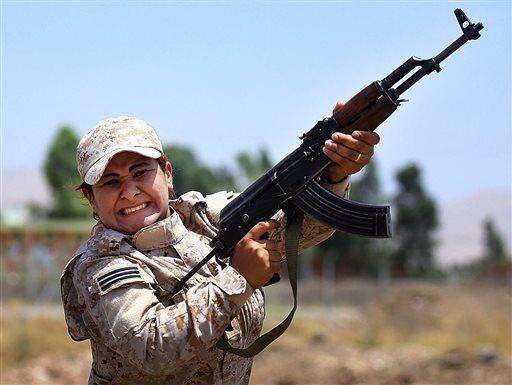
FILE - In this Thursday, July 3, 2014 file photo, a member of an elite unit of women Kurdish Peshmerga fighters trains in Sulaimaniyah, 160 miles (260 kilometers) northeast of Baghdad, Iraq. When the Islamic State group staged a lightening advance across much of northern Iraq last year, it expanded its rule to about a third of the country, drawing in different groups with different motivations for taking up arms. In many cases, former rivals are now finding themselves in an uneasy alliance as they seek to combat the Sunni extremist group. Here are the groups involved in the anti-Islamic State war in Iraq and what they each hope to accomplish. (AP Photo, File)
The Associated Press
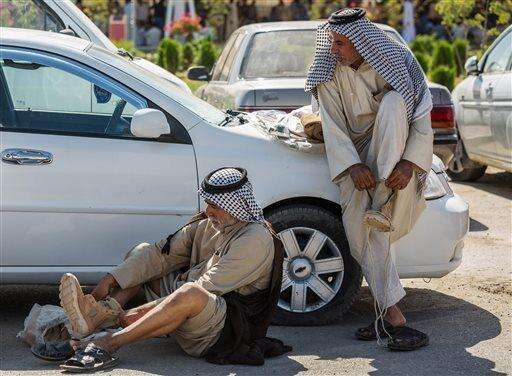
FILE - In this Tuesday, June 24, 2014 file photo, members of an Iraqi volunteer force put on their newly issued boots in the Shiite holy city of Karbala, 50 miles (80 kilometers) south of Baghdad, Iraq. When the Islamic State group staged a lightening advance across much of northern Iraq last year, it expanded its rule to about a third of the country, drawing in different groups with different motivations for taking up arms. In many cases, former rivals are now finding themselves in an uneasy alliance as they seek to combat the Sunni extremist group. Here are the groups involved in the anti-Islamic State war in Iraq and what they each hope to accomplish. (AP Photo/Ahmed al-Husseini, File)
The Associated Press
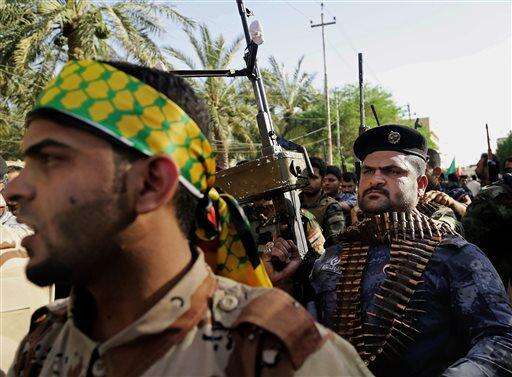
FILE - In this Monday, June 16, 2014 file photo, Shiite tribal fighters raise their weapons and chant slogans against the al-Qaida-inspired Islamic State of Iraq and the Levant (ISIL), now called the Islamic State group, in Basra, Iraq. When the Islamic State group staged a lightning advance across much of northern Iraq last year, it expanded its rule to about a third of the country, drawing in different groups with different motivations for taking up arms. In many cases, former rivals are now finding themselves in an uneasy alliance as they seek to combat the Sunni extremist group. (AP Photo/Nabil Al-Jurani, File)
The Associated Press
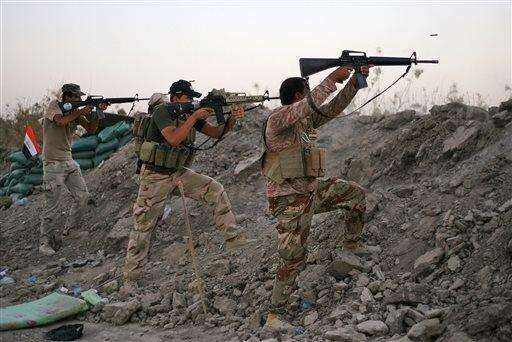
FILE - In this Sunday, Sept. 28, 2014 file photo, Iraqi Shiite militiamen fire their weapons during clashes with militants from the Islamic State group, in Jurf al-Sakhar, 43 miles (70 kilometers) south of Baghdad, Iraq. When the Islamic State group staged a lightning advance across much of northern Iraq last year, it expanded its rule to about a third of the country, drawing in different groups with different motivations for taking up arms. In many cases, former rivals are now finding themselves in an uneasy alliance as they seek to combat the Sunni extremist group. (AP Photo, File)
The Associated Press
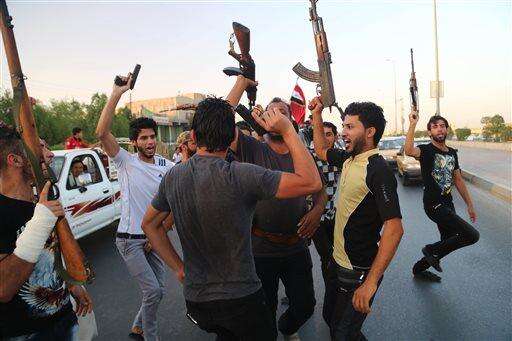
FILE - In this Sunday, June 15, 2014 file photo, Shiite tribal fighters raise their weapons and chant slogans against the al-Qaida-inspired Islamic State group in Basra, Iraq. When the Islamic State group staged a lightning advance across much of northern Iraq last year, it expanded its rule to about a third of the country, drawing in different groups with different motivations for taking up arms. In many cases, former rivals are now finding themselves in an uneasy alliance as they seek to combat the Sunni extremist group. (AP Photo/ Nabil Al-Jurani, File)
The Associated Press
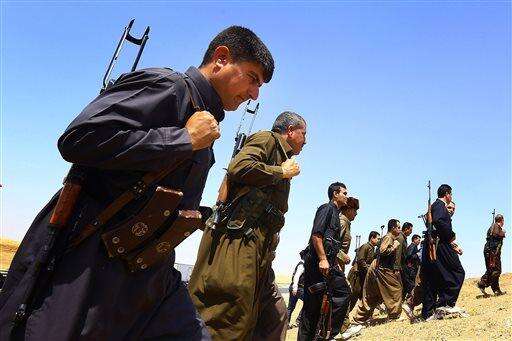
FILE - in this Saturday, June 14, 2014 file photo, Kurdish Peshmerga security forces stand guard on the outskirts of the northern city of Mosul, Iraq. When the Islamic State group staged a lightning advance across much of northern Iraq last year, it expanded its rule to about a third of the country, drawing in different groups with different motivations for taking up arms. In many cases, former rivals are now finding themselves in an uneasy alliance as they seek to combat the Sunni extremist group. (AP Photo, File)
The Associated Press
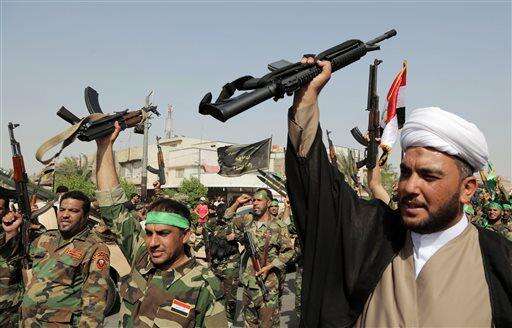
FILE - In this Saturday, June 21, 2014 file photo, volunteers of the newly formed "Peace Brigades" raise their weapons and chant slogans against the al-Qaida-inspired Islamic State of Iraq and the Levant during a parade in the Shiite stronghold of Sadr City, Baghdad, Iraq. When the Islamic State group staged a lightning advance across much of northern Iraq last year, it expanded its rule to about a third of the country, drawing in different groups with different motivations for taking up arms. In many cases, former rivals are now finding themselves in an uneasy alliance as they seek to combat the Sunni extremist group. (AP Photo/Khalid Mohammed, File)
The Associated Press
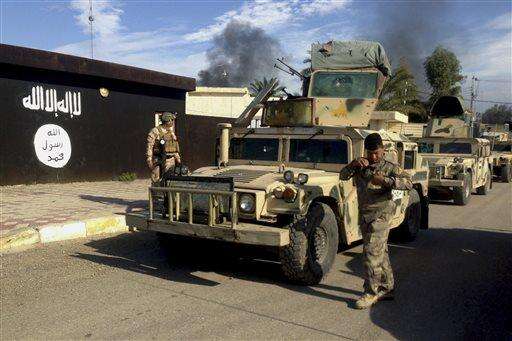
FILE - In this Monday, Nov. 24, 2014 file photo, Iraqi army soldiers deploy in front of a court run by the Islamic State group after a military operation to regain control of the town of Sadiyah in Diyala province, 60 miles (95 kilometers) north of Baghdad, Iraq. When the Islamic State group staged a lightning advance across much of northern Iraq last year, it expanded its rule to about a third of the country, drawing in different groups with different motivations for taking up arms. In many cases, former rivals are now finding themselves in an uneasy alliance as they seek to combat the Sunni extremist group. (AP Photo, File)
The Associated Press